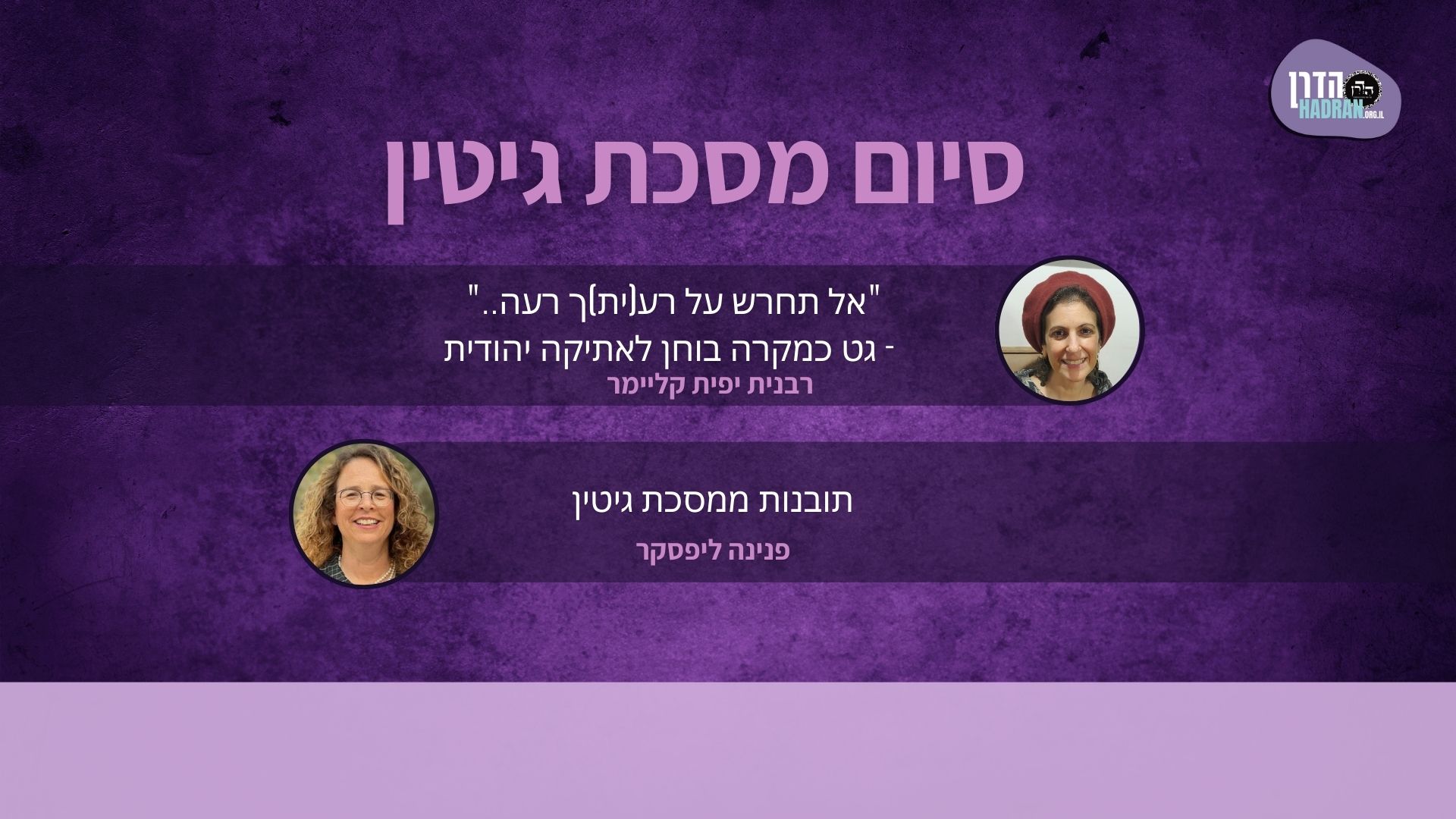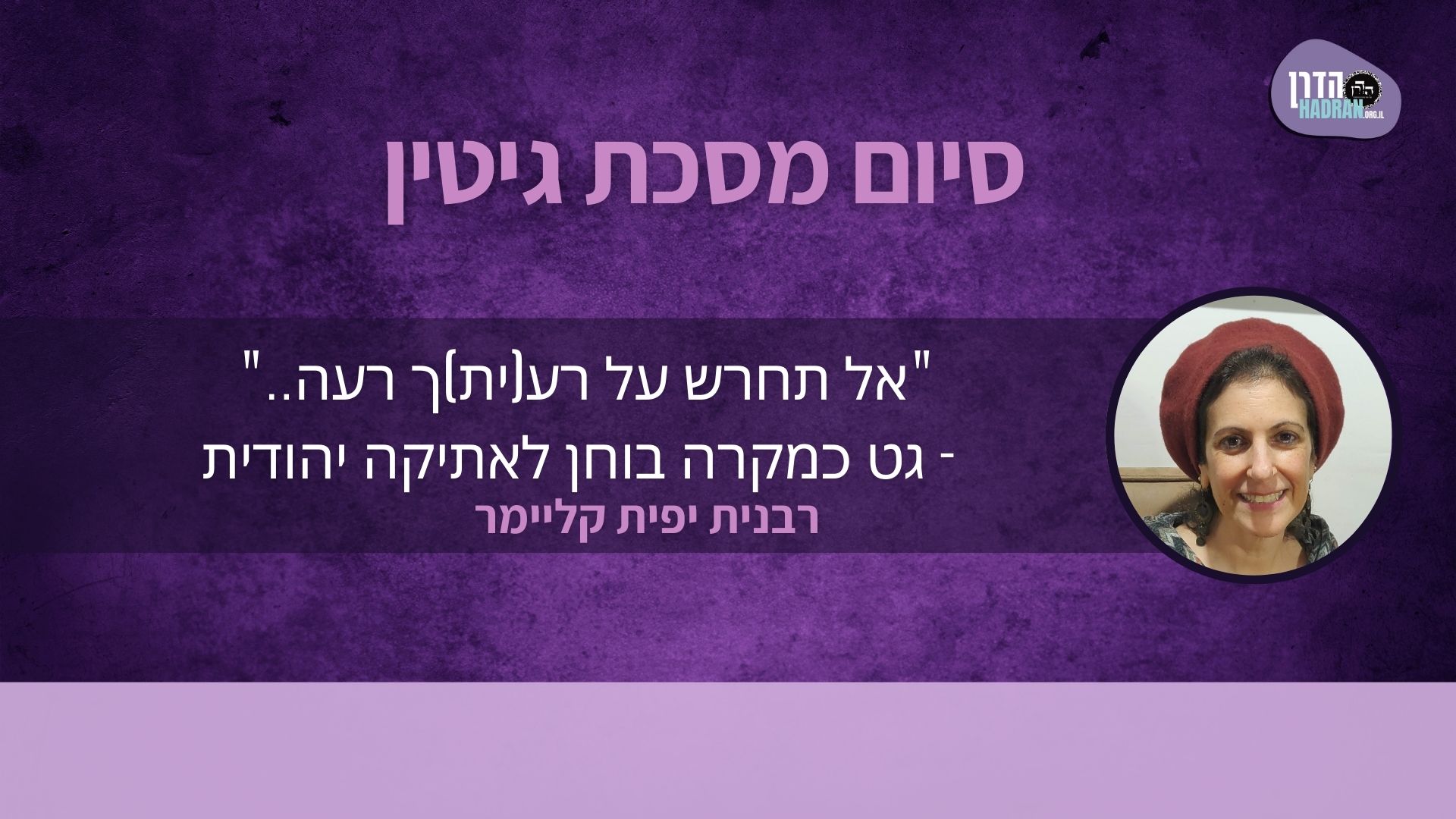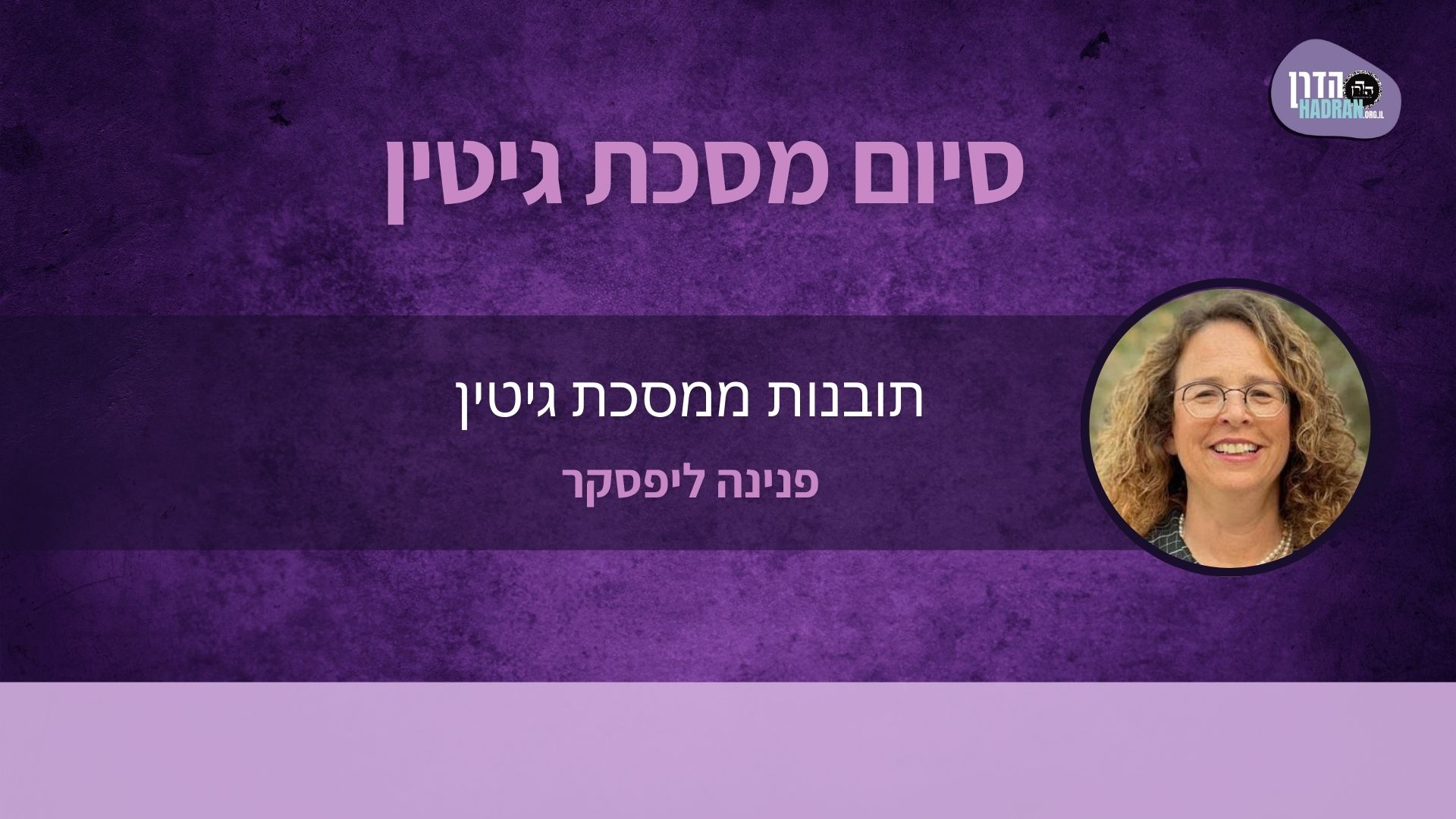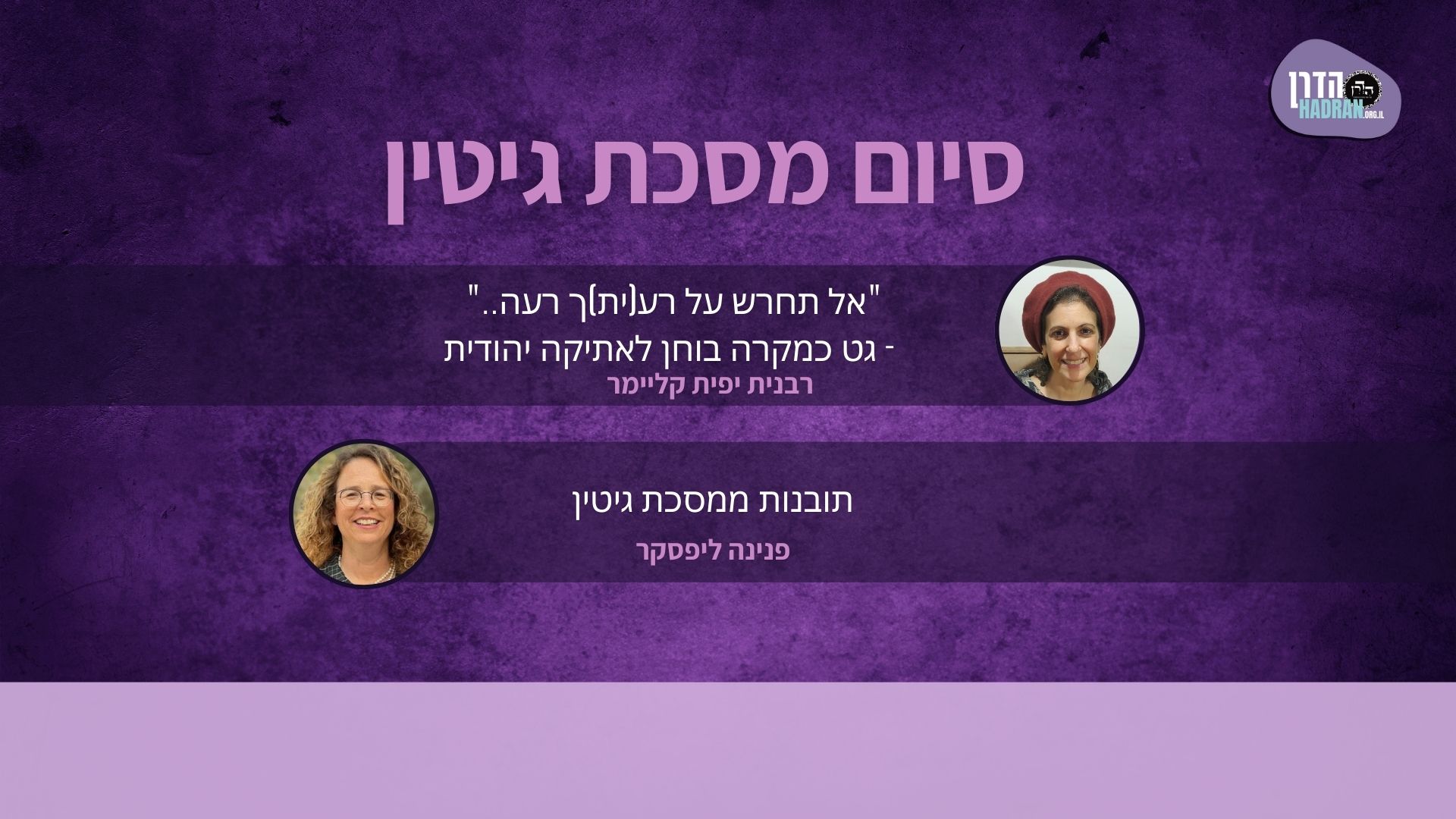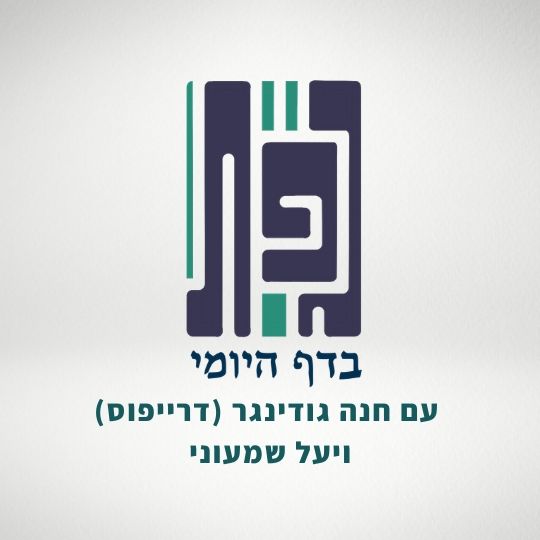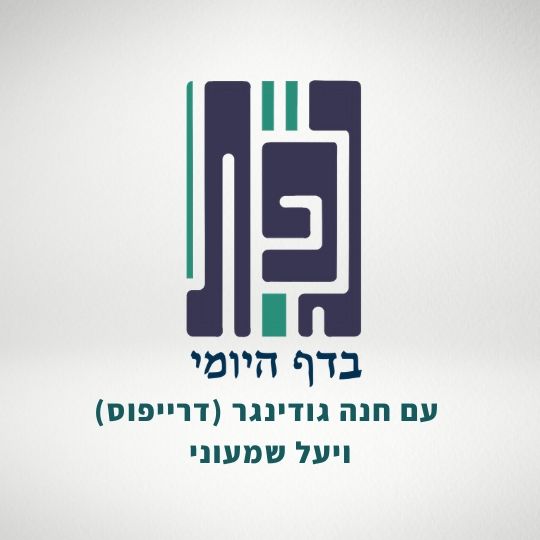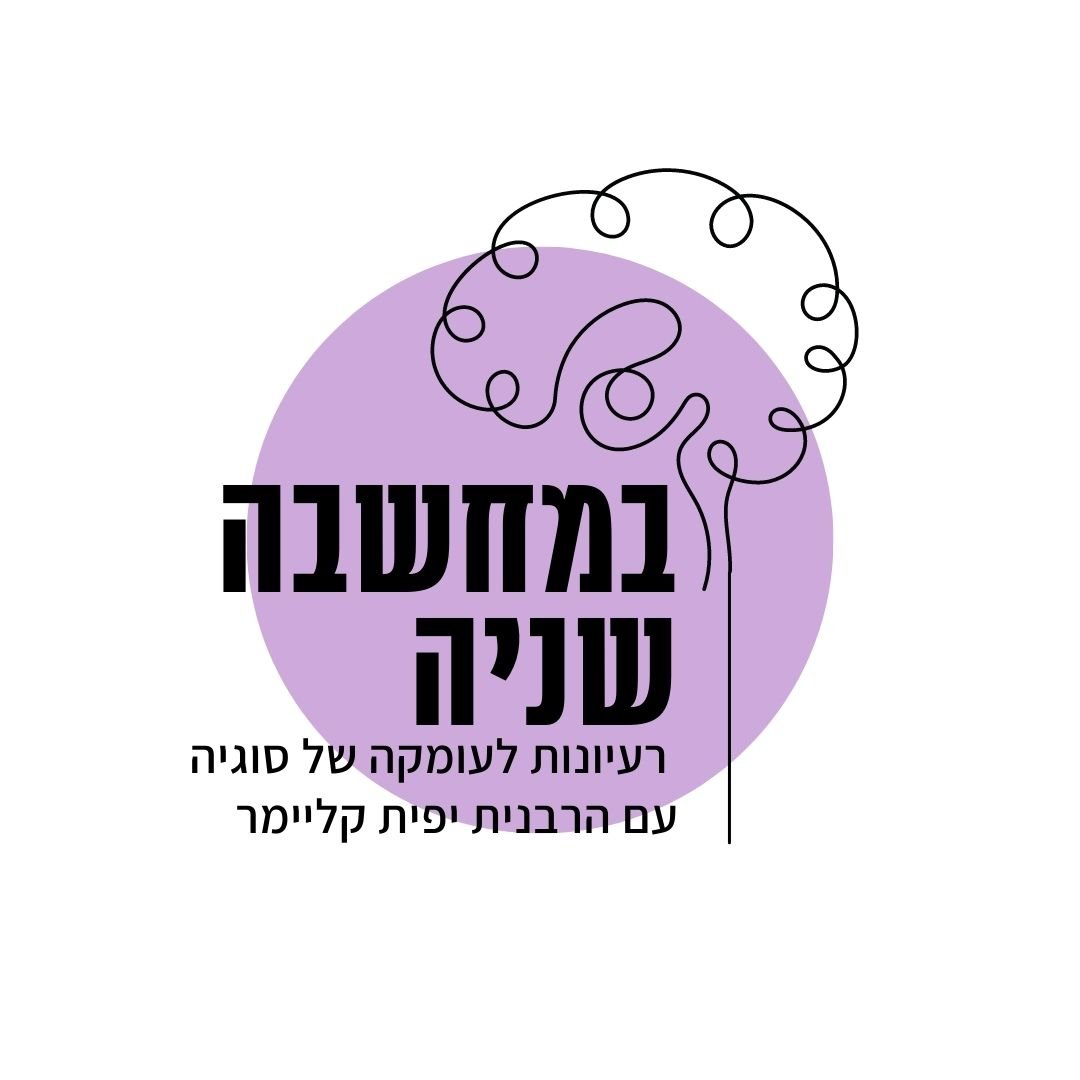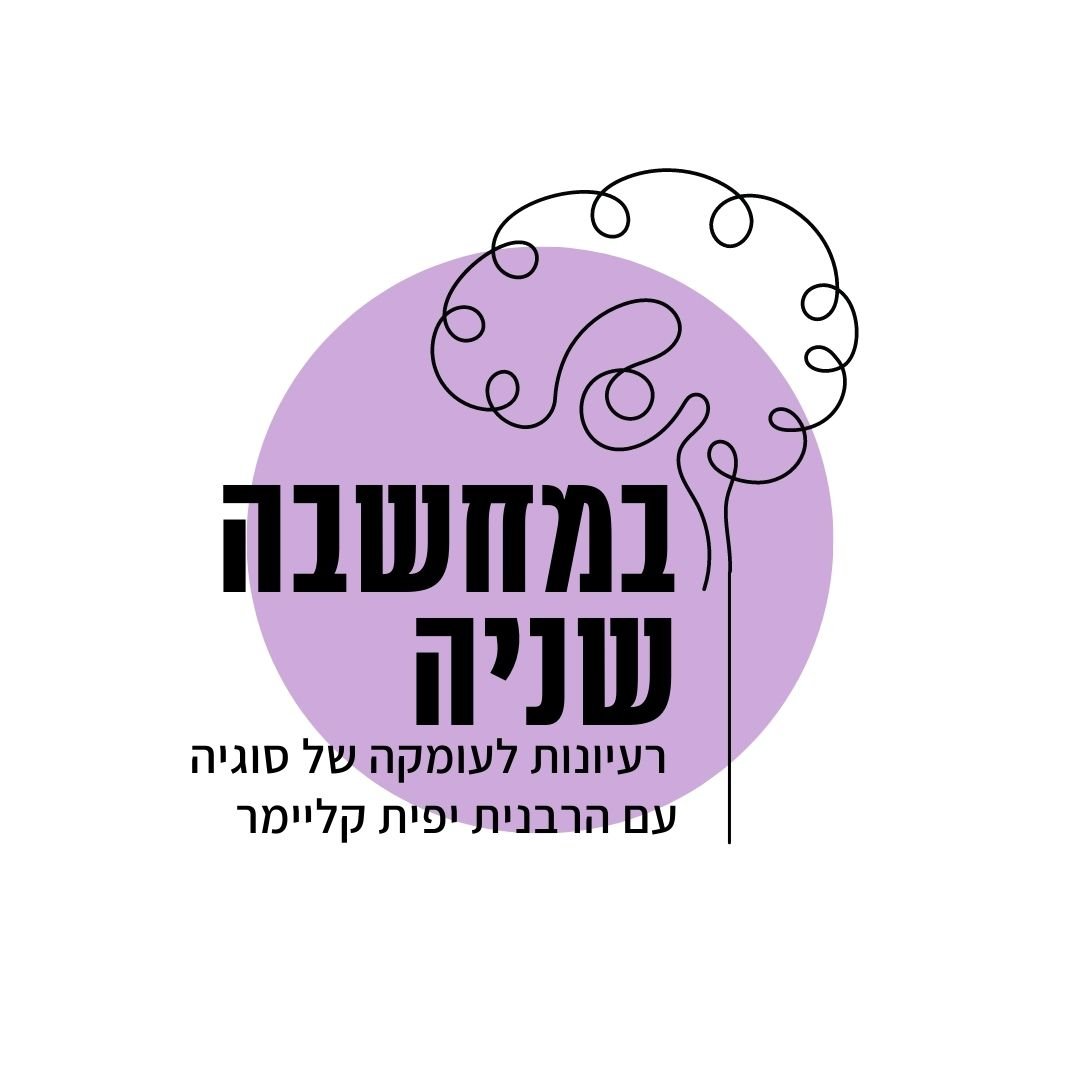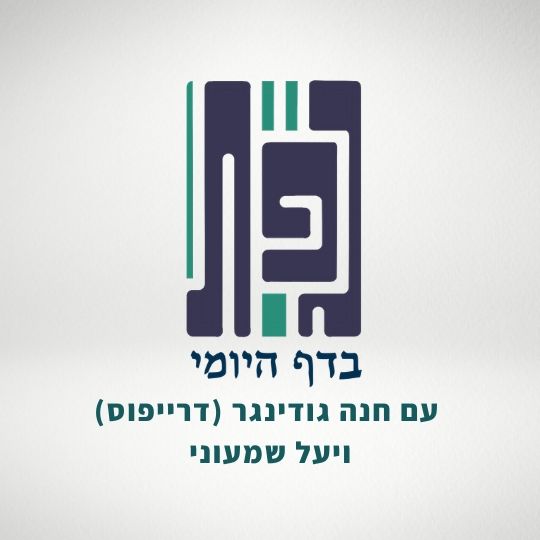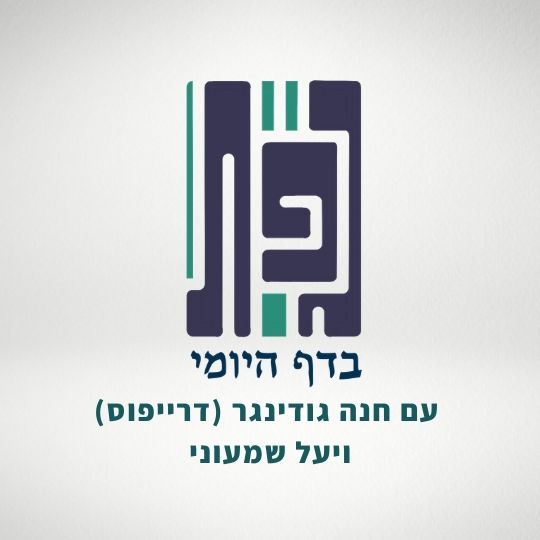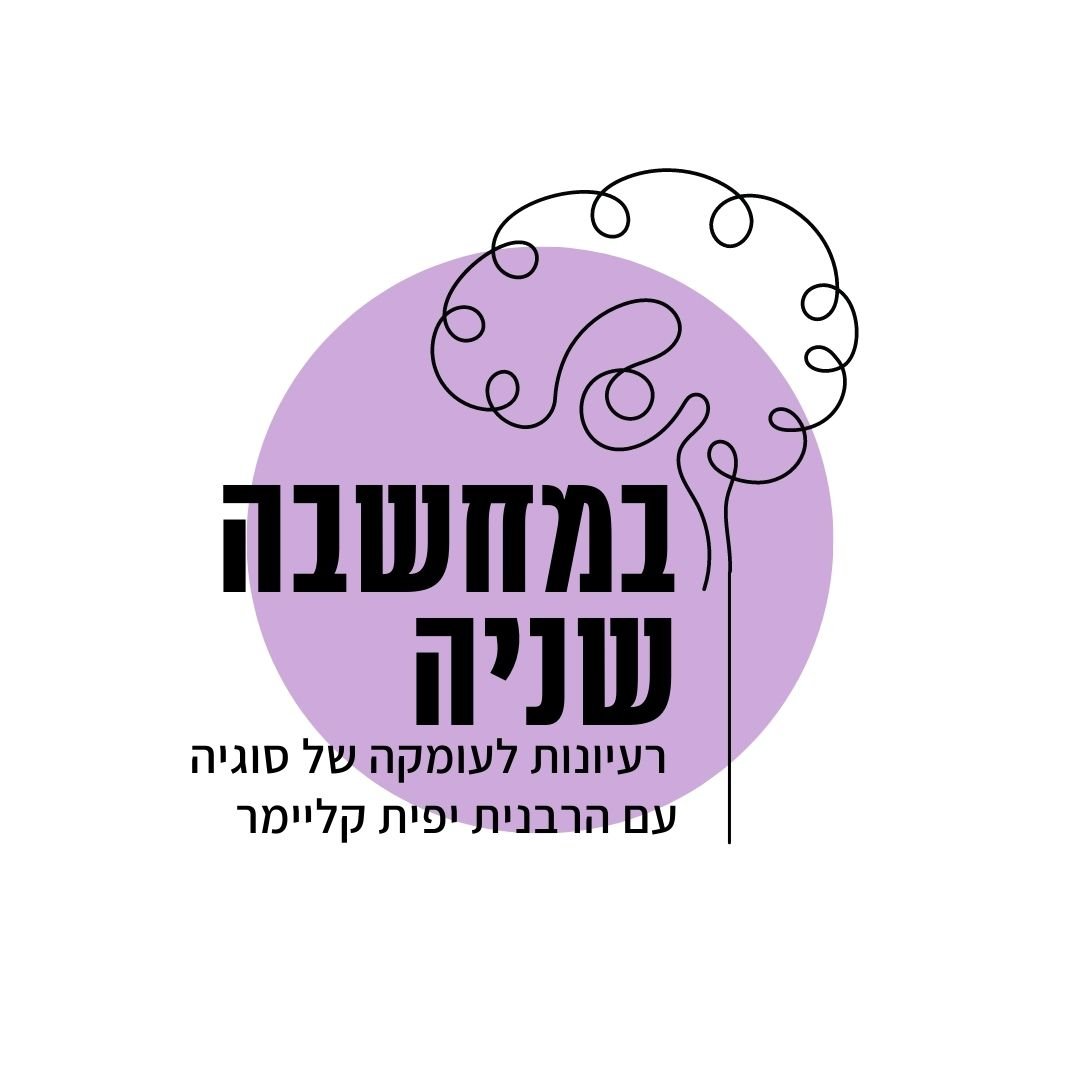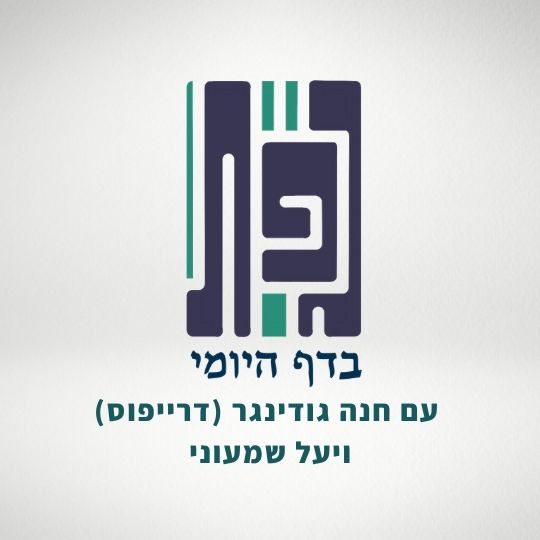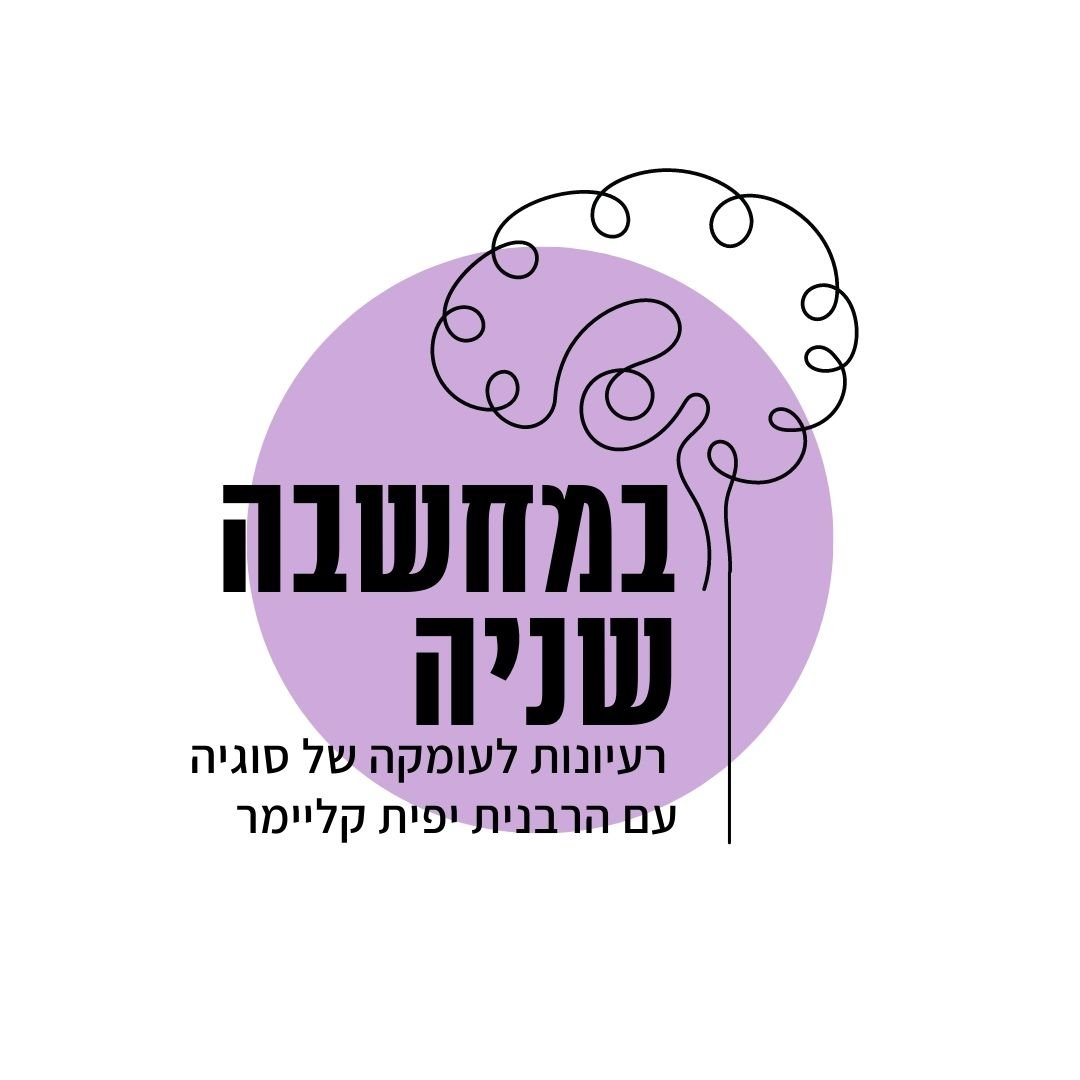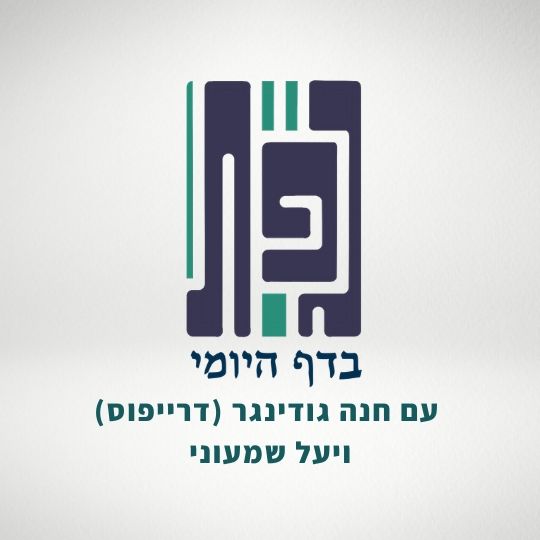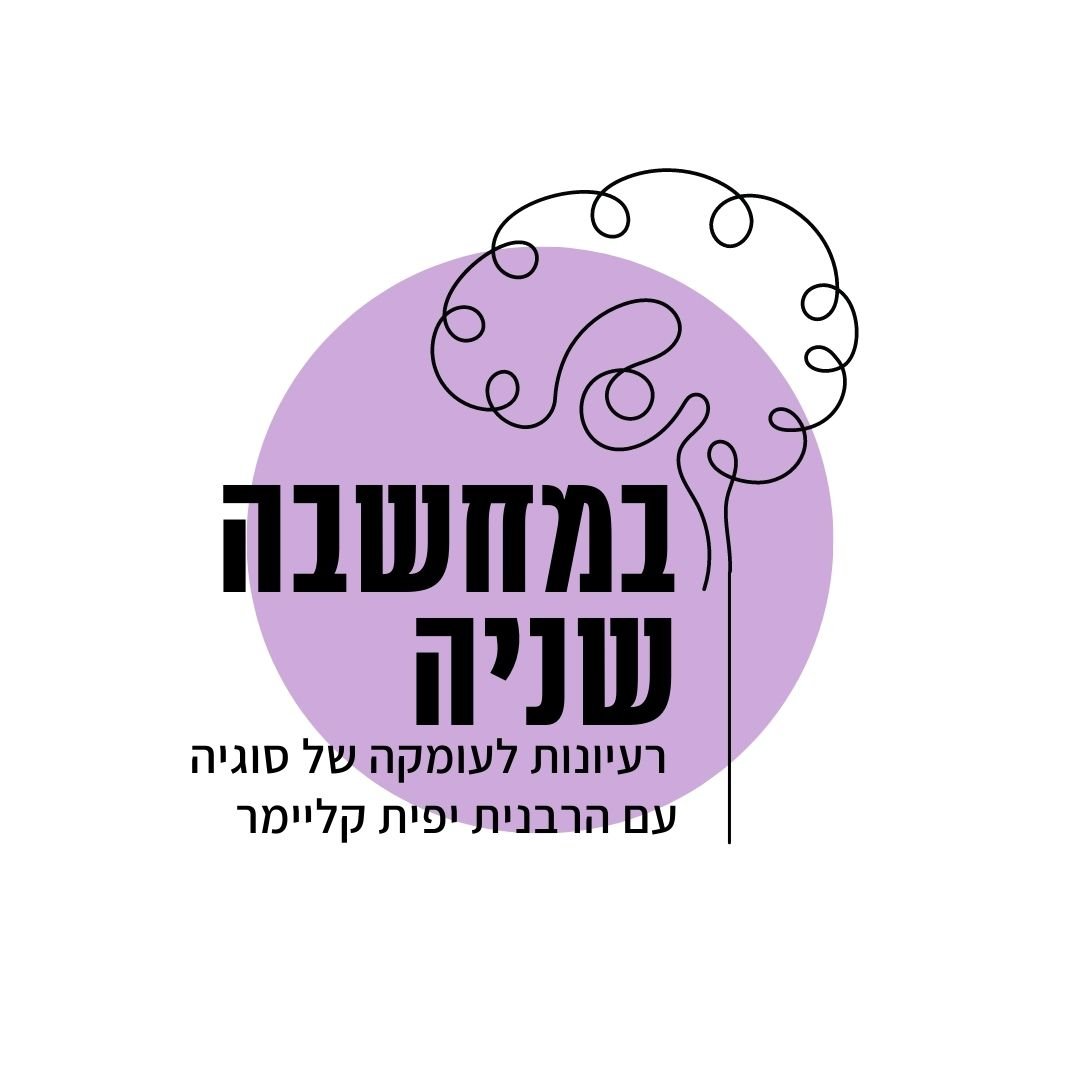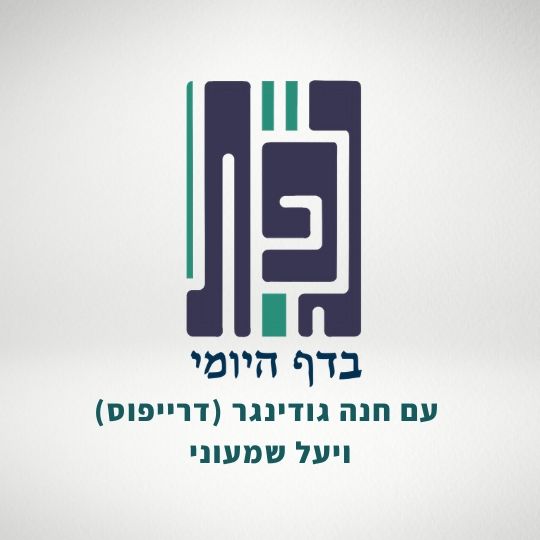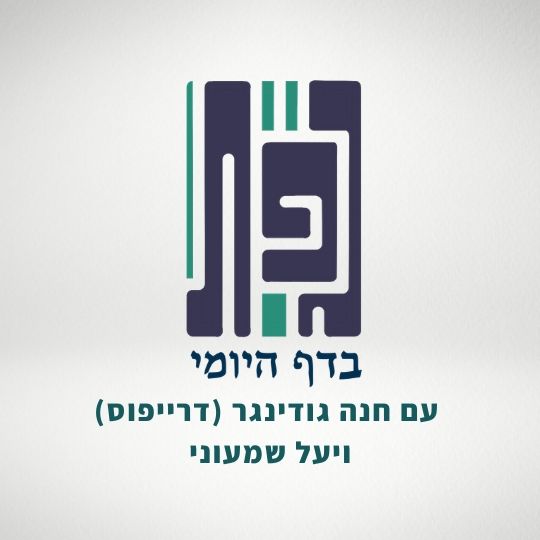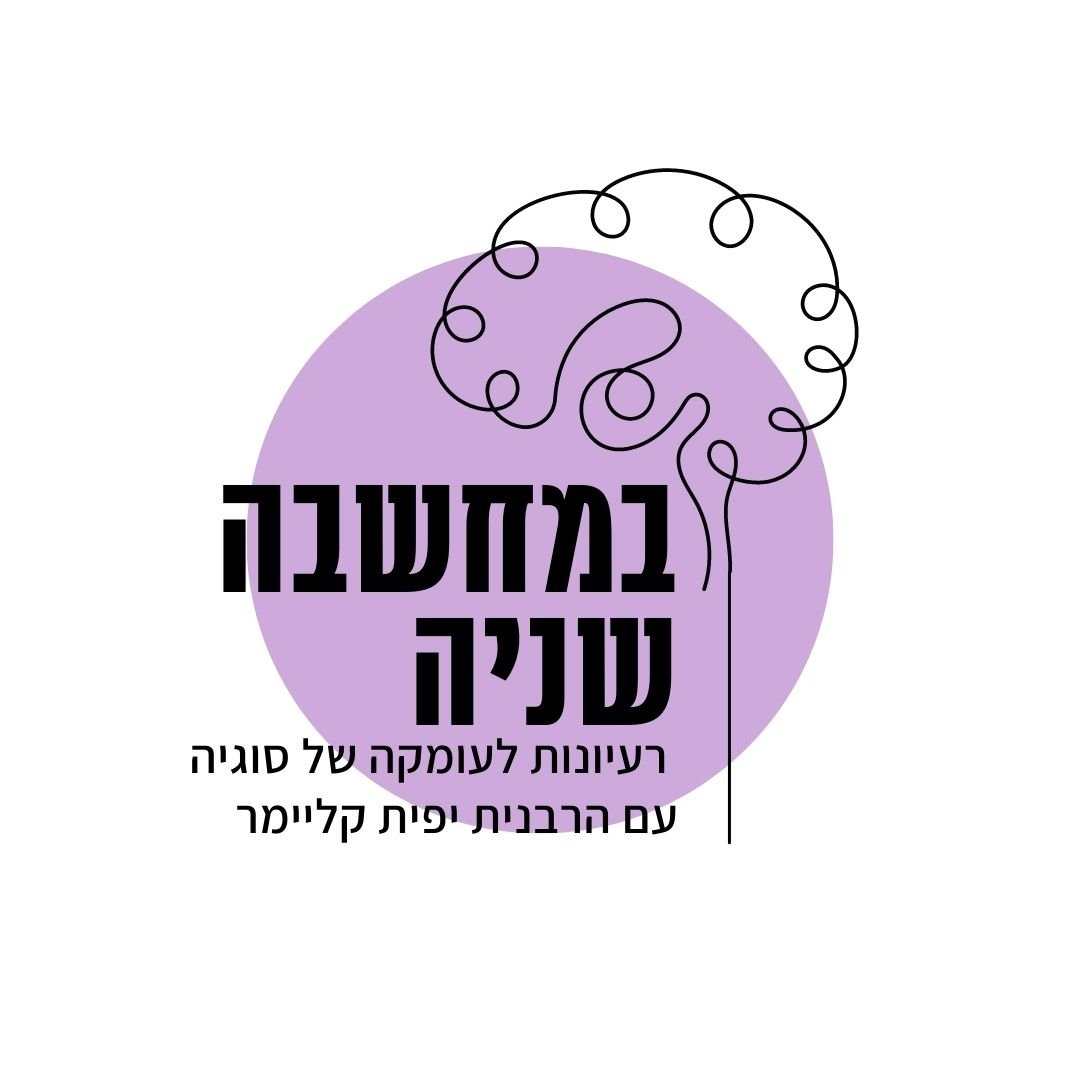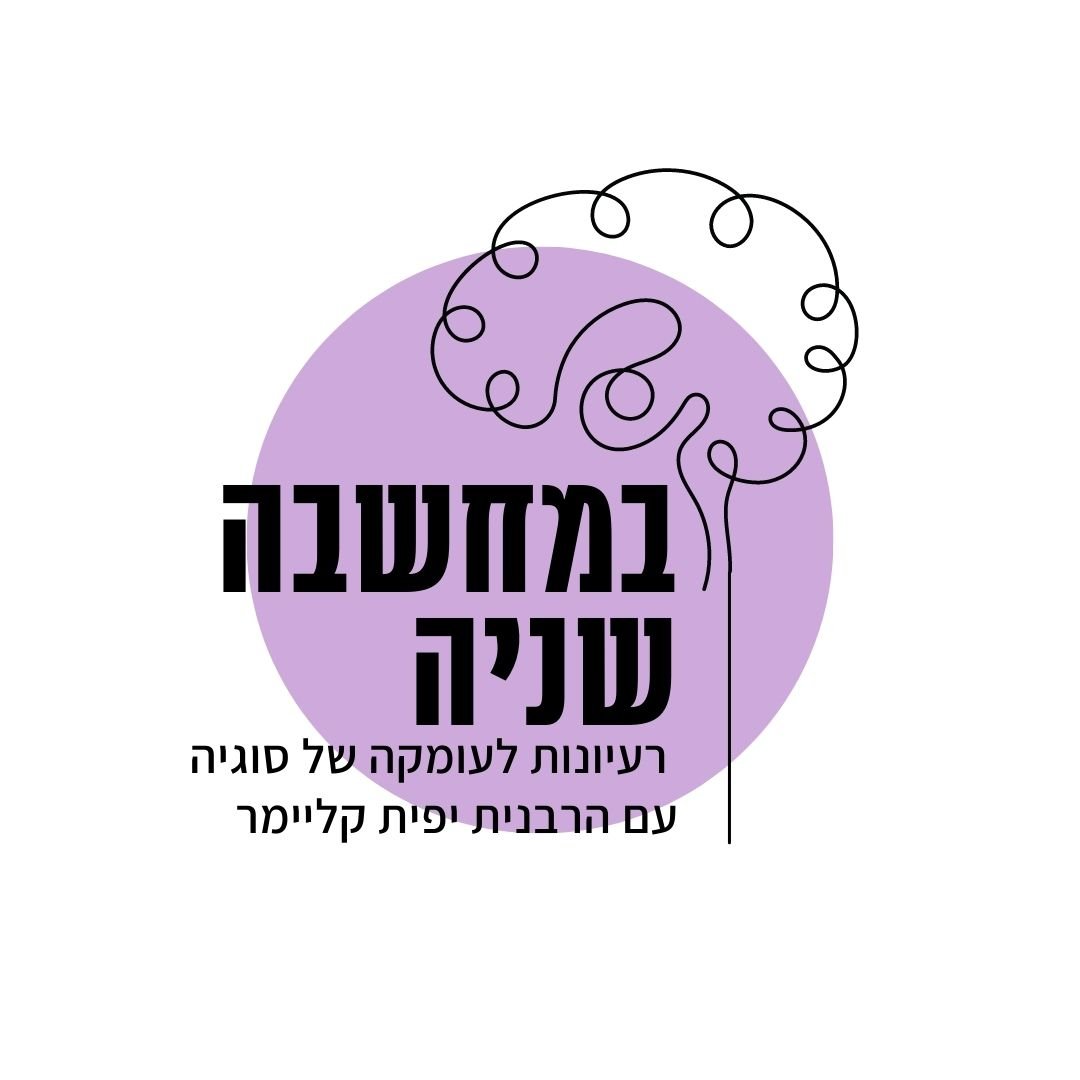הדף היום מוקדש ע”י נטלי ויסמן לכבוד ציפי וולקנפלד ולע”נ קיקי.
הלימוד השבוע מוקדש לזכות ולשלום הַיְימׇנוֹט אֱמוּנָה בַּת באנצ’י (קָסָאוּ) בת 11 שנעלמה במקום מגוריה בצפת, לפני שנתיים, ביום ט”ז אדר תשפ”ד (25.2.24), ולא נודעו עקבותיה.
הלימוד השבוע מוקדש למען ביטחון המדינה, החיילים והאזרחים, ולמען חירותו של העם האיראני. שנזכה בקרוב שיתקיים בנו הפסוק: "לַיְּהוּדִים הָיְתָה אוֹרָה וְשִׂמְחָה וְשָׂשֹׂן וִיקָר”.
רוצה להקדיש שיעור?

כלים
הלימוד השבוע מוקדש לזכות ולשלום הַיְימׇנוֹט אֱמוּנָה בַּת באנצ’י (קָסָאוּ) בת 11 שנעלמה במקום מגוריה בצפת, לפני שנתיים, ביום ט”ז אדר תשפ”ד (25.2.24), ולא נודעו עקבותיה.
הלימוד השבוע מוקדש למען ביטחון המדינה, החיילים והאזרחים, ולמען חירותו של העם האיראני. שנזכה בקרוב שיתקיים בנו הפסוק: "לַיְּהוּדִים הָיְתָה אוֹרָה וְשִׂמְחָה וְשָׂשֹׂן וִיקָר”.
כלים
העמקה
רוצה להבין מה באמת קורה מתחת לפני השטח של הסוגיה?
שיעורים, פודקאסטים והרחבות של מיטב המורות שלנו יפתחו לך עוד זוויות וכיווני חשיבה.
חדשה בלימוד הגמרא?
זה הדף הראשון שלך? איזו התרגשות עצומה! יש לנו בדיוק את התכנים והכלים שיעזרו לך לעשות את הצעדים הראשונים ללמידה בקצב וברמה שלך, כך תוכלי להרגיש בנוח גם בתוך הסוגיות המורכבות ומאתגרות.
פסיפס הלומדות שלנו
גלי את קהילת הלומדות שלנו, מגוון נשים, רקעים וסיפורים. כולן חלק מתנועה ומסע מרגש ועוצמתי.
גיטין פו
לְאַפּוֹקֵי מִדִּבְעָא מִינֵּיהּ רָבָא מֵרַב נַחְמָן – דְּאָמַר: ״הַיּוֹם אִי אַתְּ אִשְׁתִּי וּלְמָחָר אַתְּ אִשְׁתִּי״.
was instituted to the exclusion of that which Rava asked Rav Naḥman, with regard to a case where the husband said to his wife while handing her the bill of divorce: Today you are not my wife and tomorrow you are my wife. Does this limitation take effect? Although the conclusion of that inquiry was that once the wife is divorced she is divorced forever, Rava instituted the addition of this expression in the text of the bill of divorce to remove any uncertainty with regard to such a case.
גּוּפוֹ שֶׁל גֵּט שִׁחְרוּר: ״הֲרֵי אַתְּ (בַּת) [בֶּן] חוֹרִין״; ״הֲרֵי אַתְּ לְעַצְמָךְ״: אַתְקֵין רַב יְהוּדָה בִּשְׁטָר זְבִינֵי דְּעַבְדֵי: ״עַבְדָּא דְּנַן מוּצְדָּק לְעַבְדוּ; וּפְטִיר וַעֲטִיר מִן חֲרוּרֵי, וּמִן עֲלוּלֵי, וּמִן עָרוֹרֵי מַלְכָּא וּמַלְכְּתָא; וּרְשׁוּם דְּאִינִישׁ לָא אִית עֲלוֹהִי, וּמְנוּקֶּה מִכֹּל מוּם, וּמִן שְׁחִין דְּנָפֵיק עַד טַצְהַר חֲדַת וְעַתִּיק״.
§ It is stated in the mishna: The basic element of a bill of manumission for a maidservant is: You are hereby a free woman, or: You are hereby your own. Rav Yehuda instituted the following formulation in a document of sale for slaves: This slave is justified, i.e., fit for slavery, and he is dismissed and removed from manumission and from accusations and from contests of the king and queen, meaning that he was not sentenced to death by the governmental court. And there is not a sign [reshum] of ownership of another person on him. And he is clean of any blemish and of boils that emerge on him for four [tatzhar] years, whether new or old.
מַאי אָסוּתֵיהּ? אָמַר אַבָּיֵי: גִּינְבְּרָא, וּמַרְתְּכָא, וְכַבְרִיתָא, וְחַלָּא דְחַמְרָא, וּמִשְׁחָא דְזֵיתָא, וְנַטְפִּיק חִיוָּרָא; וְשָׁיְיפִי לֵיהּ בְּגַדְפָּא דַאֲווֹזָא.
The Gemara asks tangentially: What is the cure for boils? Abaye said: One takes ginger [ginebara], and slag from silver, and sulfur [kavrita], and wine vinegar, and olive oil, and white naphtha [natpik], and spreads it with a goose feather.
מַתְנִי׳ שְׁלֹשָׁה גִּיטִּין פְּסוּלִין, וְאִם נִשֵּׂאת הַוּוֹלָד כָּשֵׁר –
MISHNA: Three bills of divorce are invalid ab initio, but if the woman marries another man on the basis of one of these bills of divorce the lineage of the offspring from this marriage is unflawed. In other words, she is not considered to be a married woman who engaged in sexual intercourse with another man, which would impair the lineage of their child.
כָּתַב בִּכְתַב יָדוֹ, וְאֵין עָלָיו עֵדִים; יֵשׁ עָלָיו עֵדִים, וְאֵין בּוֹ זְמַן; יֵשׁ בּוֹ זְמַן, וְאֵין בּוֹ אֶלָּא עֵד אֶחָד; הֲרֵי אֵלּוּ שְׁלֹשָׁה גִּיטִּין פְּסוּלִין, וְאִם נִשֵּׂאת – הַוָּלָד כָּשֵׁר.
These three bills are: A bill of divorce that the husband wrote in his handwriting but has no signatures of witnesses on the document at all, a case where there are signatures of witnesses on the document but there is no date written on it, and a case where there is a date written on it, but it contains only one witness. These are the three invalid bills of divorce with regard to which the Sages said: And if she marries, the lineage of the offspring is unflawed.
רַבִּי אֱלִיעֶזֶר אוֹמֵר: אַף עַל פִּי שֶׁאֵין עָלָיו עֵדִים, אֶלָּא שֶׁנְּתָנוֹ לָהּ בִּפְנֵי עֵדִים – כָּשֵׁר, וְגוֹבָה מִנְּכָסִים מְשׁוּעְבָּדִים; שֶׁאֵין הָעֵדִים חוֹתְמִים עַל הַגֵּט אֶלָּא מִפְּנֵי תִּיקּוּן הָעוֹלָם.
Rabbi Eliezer says: Even though there are no signatures of witnesses on the document, but he handed it to her in the presence of two witnesses, it is a valid bill of divorce. And on the basis of this bill of divorce the woman can collect the amount written for her in her marriage contract even from liened property, as Rabbi Eliezer maintains that the witnesses sign the bill of divorce only for the betterment of the world. If no witnesses sign a bill of divorce the husband can contest its validity at any time by denying that he wrote it. Nevertheless, the witnesses’ signatures are not an essential part of a bill of divorce.
גְּמָ׳ וְתוּ לֵיכָּא?! וְהָא אִיכָּא גֵּט יָשָׁן! הָתָם לֹא תֵּצֵא, הָכָא תֵּצֵא.
GEMARA: The Gemara asks: But are there no other invalid bills of divorce? But isn’t there an outdated bill of divorce, where the husband and wife were secluded after it was written and before it was handed to her? The Gemara answers that there is a difference between the cases: There, in the case of an outdated bill of divorce, if the woman remarries on the basis of that bill of divorce she need not leave her husband; here, she must leave him.
הָנִיחָא לְמַאן דְּאָמַר: הָכָא תֵּצֵא, אֶלָּא לְמַאן דְּאָמַר: הָכָא לֹא תֵּצֵא, מַאי אִיכָּא לְמֵימַר?
The Gemara asks: This works out well according to the one who says that here she must leave her husband, even though the lineage of their children is unflawed. But according to the one who says that here she need not leave, what is there to say? Why is an outdated bill of divorce not mentioned in the mishna?
הָתָם תִּינָּשֵׂא לְכַתְּחִלָּה, הָכָא דִּיעֲבַד.
The Gemara answers: There is still a difference between the cases, as there, in the case of an outdated bill of divorce, she may remarry ab initio; while here, it is only after the fact, if she remarried, that she need not leave her second husband.
וְהָא אִיכָּא גֵּט קֵרֵחַ! הָתָם הַוּוֹלָד מַמְזֵר, הָכָא הַוָּלָד כָּשֵׁר.
The Gemara asks: But isn’t there a bare bill of divorce, i.e., one that is missing a signature, which is also invalid? The Gemara answers: There, if the woman remarries based on this bill of divorce the offspring of her second marriage is a mamzer; here, the lineage of the offspring is unflawed.
הָנִיחָא לְרַבִּי מֵאִיר (דְּאָמַר: כׇּל הַמְשַׁנֶּה מִמַּטְבֵּעַ שֶׁטָּבְעוּ חֲכָמִים בְּגִיטִּין, הַוָּלָד מַמְזֵר). אֶלָּא לְרַבָּנַן, מַאי אִיכָּא לְמֵימַר?
The Gemara asks: This works out well according to Rabbi Meir, who said that anyone who deviates from the formula coined by the Sages with regard to bills of divorce renders the offspring a mamzer. Therefore, a bare bill of divorce is completely invalid, and if the woman remarries the offspring is a mamzer. But according to the Rabbis, who hold that the offspring is not a mamzer, what is there to say? Why is a bare bill of divorce not listed in the mishna?
הָתָם תֵּצֵא, הָכָא לֹא תֵּצֵא.
The Gemara answers that there is still a distinction between the cases: There, if the woman remarries she must leave her husband, even according to the Rabbis who hold that the offspring is not a mamzer; here, she need not leave her husband.
הָנִיחָא לְמַאן דְּאָמַר הָכָא לֹא תֵּצֵא, אֶלָּא לְמַאן דְּאָמַר הָכָא תֵּצֵא, מַאי אִיכָּא לְמֵימַר? בִּמְקוּשָּׁר לָא קָא מַיְירֵי.
The Gemara asks: This works out well according to the one who says that here she need not leave her husband; but according to the one who says that here she must leave her husband, what is there to say? The Gemara answers: Apparently the mishna is not speaking about a folded and tied bill of divorce, which requires a signature on every fold, but rather, an open bill of divorce. There are only three cases in which this type of a bill of divorce is invalid in a manner that obligates the woman, if she remarries, to leave her second husband, although the lineage of their children would be unflawed.
וְהָא אִיכָּא שְׁלוֹם מַלְכוּת! הָתָם תֵּצֵא, הָכָא לֹא תֵּצֵא.
The Gemara asks: But isn’t there a bill of divorce that is invalid due to the need to maintain peaceful relations with the kingdom, as it mentions the year of the divorce according to the age of another kingdom? Why is this not mentioned in the mishna? The Gemara answers: There, she must leave her husband; here, she need not leave her husband.
הָנִיחָא לְמַאן דְּאָמַר הָכָא לֹא תֵּצֵא, אֶלָּא לְמַאן דְּאָמַר תֵּצֵא, מַאי אִיכָּא לְמֵימַר? (הָתָם הַוָּלָד מַמְזֵר, הָכָא הַוָּלָד כָּשֵׁר.
The Gemara asks: This works out well according to the one who says that here she need not leave her husband. But according to the one who says that she must leave her husband, what is there to say? The Gemara answers: There, the offspring is a mamzer; here, the lineage of the offspring is unflawed.
הָנִיחָא לְרַבִּי מֵאִיר, אֶלָּא לְרַבָּנַן מַאי אִיכָּא לְמֵימַר?) מוֹקֵים לַהּ כִּדְרַבִּי מֵאִיר; וְהָתָם הַוָּלָד מַמְזֵר, הָכָא הַוָּלָד כָּשֵׁר.
The Gemara asks: This works out well according to Rabbi Meir; but according to the Rabbis, who hold that in the case of a bill of divorce in which the date is written according to the age of another kingdom, the offspring is not a mamzer, what is there to say? The Gemara answers: The one who holds that in the cases in the mishna the woman must leave her husband establishes it in accordance with the opinion of Rabbi Meir, according to whom there, the offspring is a mamzer. Here, the lineage of the offspring is unflawed.
מִנְיָנָא דְרֵישָׁא לְמַעוֹטֵי מַאי, וּמִנְיָנָא דְסֵיפָא לְמַעוֹטֵי מַאי?
The mishna emphasizes twice that there are three bills of divorce that are invalid. The Gemara asks: What does the quantity in the first clause serve to exclude? And what does the quantity in the latter clause serve to exclude?
מִנְיָנָא דְרֵישָׁא – לְמַעוֹטֵי הָנֵי דַּאֲמַרַן.
The Gemara answers: The quantity mentioned in the first clause serves to exclude those invalid bills of divorce that we previously mentioned, which are treated either more or less stringently than the cases in the mishna.
מִנְיָנָא דְסֵיפָא – לְמַעוֹטֵי הָא דְּתַנְיָא: הַמֵּבִיא גֵּט מִמְּדִינַת הַיָּם, נְתָנוֹ לָהּ וְלֹא אָמַר לָהּ: ״בְּפָנַי נִכְתַּב וּבְפָנַי נֶחְתַּם״ – יוֹצִיא וְהַוָּלָד מַמְזֵר, דִּבְרֵי רַבִּי מֵאִיר.
The quantity mentioned in the latter clause serves to exclude that which is taught in a baraita: With regard to an agent who brings a bill of divorce for a certain woman from a country overseas, and gives it to her but does not say to her: It was written in my presence and it was signed in my presence, and she remarries, her second husband must divorce her, and the offspring of their marriage is a mamzer. This is the statement of Rabbi Meir.
וַחֲכָמִים אוֹמְרִים: אֵין הַוָּלָד מַמְזֵר. כֵּיצַד יַעֲשֶׂה? יִטְּלֶנּוּ הֵימֶנָּה, וְיַחֲזוֹר וְיִתְּנֶנּוּ לָהּ בִּפְנֵי שְׁנַיִם, וְיֹאמַר: ״בְּפָנַי נִכְתַּב וּבְפָנַי נֶחְתַּם״.
And the Rabbis say: The offspring of the second marriage is not a mamzer; rather, how should the agent act to rectify the situation? He should take the bill of divorce from her, and give it to her again in the presence of two witnesses and say: It was written in my presence and it was signed in my presence. Since this problem can be corrected, it is not listed in the mishna as one of the invalid bills of divorce.
כָּתַב בִּכְתַב יָדוֹ וְאֵין עָלָיו עֵדִים. אָמַר רַב: ״כְּתַב יָדוֹ״ שָׁנִינוּ.
§ It is stated in the mishna: A bill of divorce that the husband wrote in his handwriting, but has no signatures of witnesses on it at all, is invalid; nevertheless, if the woman remarries, the lineage of the child born from her second husband is unflawed. Rav says: We learned that this is referring to his handwriting.
אַהֵיָיא? אִילֵּימָא אַרֵישָׁא – פְּשִׁיטָא! ״כְּתַב יָדוֹ״ קָתָנֵי!
The Gemara asks: With regard to which clause of the mishna is this referring? If we say that it is referring to the first clause, what Rav said is obvious, as the case of his handwriting is explicitly taught in that clause.
וְאֶלָּא אַמְּצִיעֲתָא – הֲרֵי יֵשׁ עָלָיו עֵדִים! אֶלָּא אַסֵּיפָא: יֵשׁ בּוֹ זְמַן וְאֵין בּוֹ אֶלָּא עֵד אֶחָד –
And if it is rather referring to the middle clause, i.e., an undated bill of divorce, why does it matter whether it was written in the husband’s handwriting? Aren’t there signatures of witnesses on it? Rather, it must be referring to the latter clause in the mishna, i.e., a bill of divorce that has a date written on it but has only the signature of one witness.
וְדַוְקָא כְּתַב יָדוֹ וְעֵד; אֲבָל כְּתַב סוֹפֵר וְעֵד – לֹא.
And Rav is saying that specifically when the bill of divorce is written in his handwriting and has the signature of one witness, the woman’s child from her second husband is of unflawed lineage. But if it is written in a scribe’s handwriting, even if it includes the signature of one witness, the child’s lineage is not unflawed, but rather he is a mamzer, as the bill of divorce is completely invalid.
וּשְׁמוּאֵל אָמַר: אֲפִילּוּ כְּתַב סוֹפֵר וְעֵד, שֶׁהֲרֵי שָׁנִינוּ: כָּתַב סוֹפֵר וְעֵד – כָּשֵׁר.
And Shmuel says: Even where it is written in a scribe’s handwriting and it has the signature of a witness, the lineage of the child is unflawed, as we learned in a mishna (87b): In the case of a bill of divorce in which the scribe’s handwriting is recognizable and there is one witness signed, it is valid.
וְרַב – מִי דָּמֵי?! הָתָם תִּינָּשֵׂא לְכַתְּחִילָּה, הָכָא דִּיעֲבַד.
And Rav would respond: Is that case comparable? There, in that case, the mishna indicates that the woman may marry ab initio. Therefore, it must be a case where the scribe also signed as a second witness. But here, in the case of this mishna, the bill of divorce is invalid and the woman may not remarry; it is only if she remarried and had a child that his lineage is rendered unflawed after the fact. Therefore, it must be referring to a case where the husband wrote it.
וּשְׁמוּאֵל – לָא קַשְׁיָא; הָא בְּסָפְרָא דְּמוּבְהַק, וְהָא בְּסָפְרָא דְּלָא מוּבְהַק.
And Shmuel, who holds that both cases are referring to a bill of divorce that was written by a scribe but not signed by the scribe as one of the witnesses, would respond that the contradiction is not difficult. That mishna, where the bill of divorce is rendered valid ab initio, is referring to the handwriting of an expert scribe, who can presumably be relied upon to have written the bill of divorce properly and only according to the husband’s instructions, and this mishna is referring to the handwriting of a scribe who is not expert. Since the bill of divorce was not signed by two witnesses, there is concern that the scribe did not write it properly.
וְכֵן אָמַר רַבִּי יוֹחָנָן: ״כְּתַב יָדוֹ״ שָׁנִינוּ. אָמַר לֵיהּ רַבִּי אֶלְעָזָר: הֲרֵי יֵשׁ עָלָיו עֵדִים! אֲמַר לֵיהּ: אַסֵּיפָא.
And similarly, Rabbi Yoḥanan says in accordance with the opinion of Rav: We learned that the mishna is referring to his handwriting. Rabbi Elazar, assuming that Rabbi Yoḥanan was explaining the middle clause, said to him: Aren’t there signatures of witnesses in the bill of divorce? Why is the husband’s handwriting necessary? Rabbi Yoḥanan said to him: I was referring to the latter clause, in which there is only one witness.
זִימְנִין אָמַר רַב: תֵּצֵא, זִימְנִין אָמַר רַב: לֹא תֵּצֵא.
§ With regard to the three invalid bills of divorce mentioned in the mishna, sometimes Rav said that if the woman remarries based on one of these bills of divorce she must leave her second husband, and sometimes Rav said that she need not leave.
הָא כֵּיצַד? יֵשׁ לָהּ בָּנִים – לֹא תֵּצֵא, אֵין לָהּ בָּנִים – תֵּצֵא.
How so? How can the contradiction between Rav’s statements be explained? If she already has children from her second husband then she need not leave him, as, if she is required to leave him there will be slander that their children are mamzerim. But if she does not have children from him, she must leave him.
מֵתִיב מָר זוּטְרָא בַּר טוֹבִיָּה: וְכוּלָּן, שֶׁהָיוּ בָּהֶן סְפֵק קִידּוּשִׁין אוֹ סְפֵק גֵּירוּשִׁין – הֲרֵי אֵלּוּ חוֹלְצוֹת וְלֹא מִתְיַבְּמוֹת.
Mar Zutra bar Toviya raises an objection to Rav’s opinion from a mishna (Yevamot 30b). With regard to a woman whose husband died childless [yevama] but who is prohibited from marrying her late husband’s brother [yavam] because he is a forbidden relative to her, not only is she herself exempt from levirate marriage, but she causes any rival wives of hers to be exempt as well, even if they are not forbidden relatives to the brother. The mishna lists fifteen examples of such forbidden relatives (Yevamot 2a). And if any of these fifteen women had undergone a betrothal or divorce whose status is uncertain with the deceased brother, those rival wives must perform the ritual through which the yavam frees the yevama of her levirate bonds [ḥalitza] and may not enter into levirate marriage, since they are possibly the rival wives of a forbidden relative.
כֵּיצַד סְפֵק קִידּוּשִׁין? זָרַק לָהּ קִידּוּשִׁין – סָפֵק קָרוֹב לָהּ, סָפֵק קָרוֹב לוֹ, זֶהוּ סְפֵק קִידּוּשִׁין.
How could there be a betrothal whose status is uncertain? If he threw her money or a document as betrothal in the public domain, and the item was possibly closer to her, whereby she could acquire the object and become betrothed, and possibly closer to him, preventing her from acquiring it, this is a case of a betrothal whose status is uncertain.
סְפֵק גֵּירוּשִׁין – כָּתַב בִּכְתַב יָדוֹ וְאֵין עָלָיו עֵדִים, יֵשׁ עָלָיו עֵדִים וְאֵין בּוֹ זְמַן, יֵשׁ בּוֹ זְמַן וְאֵין בּוֹ אֶלָּא עֵד אֶחָד – הֲרֵי זֶה סְפֵק גֵּירוּשִׁין.
How can there be a divorce whose status is uncertain? It is in the cases of invalid bills of divorce mentioned in the mishna here: A bill of divorce that the husband wrote in his handwriting but has no signatures of witnesses on the document at all, a case where there are signatures of witnesses on the document but there is no date written on it, and a case where there is a date written on it but it contains only one witness. In each of the three cases, this is considered a divorce whose status is uncertain.
וְאִי אָמְרַתְּ לֹא תֵּצֵא, צָרָתָהּ אָתְיָא לְיַבּוֹמֵי!
And if you say that despite this woman’s problematic divorce she need not leave her second husband, her rival wife from her first marriage might come to enter into levirate marriage after the first husband’s death, assuming that she was already divorced. This would violate the ruling of the mishna in tractate Yevamot that she may not do so, as the status of the divorce is uncertain and therefore it is uncertain whether she is the rival wife of a forbidden relative.
תִּתְיַבֵּם, וְאֵין בְּכָךְ כְּלוּם; חֲשָׁשָׁא דְרַבָּנַן הִיא.
The Gemara answers: She may enter into levirate marriage, and there is no problem with that, as the difficulty with the bill of divorce is merely a concern by rabbinic law. By Torah law it is a complete bill of divorce, and the rival wife is fit for levirate marriage.
לֵוִי אָמַר: לְעוֹלָם לֹא תֵּצֵא. וְכֵן אָמַר רַבִּי יוֹחָנָן: לְעוֹלָם לֹא תֵּצֵא.
Contrary to Rav’s opinion that a woman who remarries based on one of these bills of divorce must leave her second husband unless they have children, Levi says that she is never required to leave him, whether or not they have children. And similarly, Rabbi Yoḥanan says that she is never required to leave him.
וְכֵן אֲמַר לְהוּ רַבִּי יוֹחָנָן לִבְנֵי רַבִּי חֲלַפְתָּא דְּמִן הוּנָא, הָכִי אָמַר אֲבוּכוֹן: לְעוֹלָם לֹא תֵּצֵא; וְקַרְצִית שֶׁבֶּעָמִיר אֵינָהּ פּוֹסֶלֶת בְּמֵי חַטָּאת.
And similarly, Rabbi Yoḥanan said to the sons of Rabbi Ḥalafta of Huna: Your father said the following two statements that I heard from him: That she is never required to leave him, and that a kartzit in the sheaf does not disqualify water of purification (see Numbers 19:17–19). Even if a kartzit drinks from this water, it may still be sprinkled on a person in order to purify him from ritual impurity imparted by a corpse.
מַאי קַרְצִית? אָמַר אַבָּיֵי: דִּידְבְּתָא דְּבֵינֵי כֵיפֵי.
The Gemara asks: What is a kartzit? Abaye said that it is a species of fly [didveta] that is found between the sheaves.
מֵתִיב רַב דָּנִיאֵל בַּר רַב קַטִּינָא: כׇּל הָעוֹפוֹת פּוֹסְלִין בְּמֵי חַטָּאת, חוּץ מִן הַיּוֹנָה – מִפְּנֵי שֶׁמּוֹצֶצֶת. וְאִם אִיתָא, נִיתְנֵי: חוּץ מִיּוֹנָה וְקַרְצִית!
Rav Daniel bar Rav Ketina raises an objection to this ruling from the Mishna (Para 9:3): All birds disqualify water of purification by drinking from it, because some of the water spills from the bird’s beak back into the basin after being disqualified by having been in the bird’s mouth. This is the halakha with regard to all birds except for the pigeon, because it sucks the water, which prevents it from spilling back. And if it is so that a kartzit does not disqualify water of purification, let the mishna teach that all birds disqualify except for the pigeon and the kartzit.
לָא פְּסִיקָא לֵיהּ, דִּגְדוֹלָה לָא פָּסְלָה, וּקְטַנָּה פָּסְלָה. וְעַד כַּמָּה? אָמַר רַבִּי יִרְמְיָה, וְאִיתֵּימָא רַבִּי אַמֵּי: עַד כְּזַיִת.
The Gemara answers: The matter is not clear-cut, as, while a large kartzit does not disqualify the water, a small one does disqualify it. This ruling is not mentioned in the mishna, as it is not common to all species of kartzit. The Gemara asks: And how small must a kartzit be to disqualify water of purification? Rabbi Yirmeya said, and some say that it was Rabbi Ami who said: The size is up to an olive-bulk.
רַבִּי אֶלְעָזָר אוֹמֵר: אַף עַל פִּי וְכוּ׳. אָמַר רַב יְהוּדָה אָמַר רַב: הֲלָכָה כְּרַבִּי אֶלְעָזָר בְּגִיטִּין. כִּי אַמְרִיתַהּ קַמֵּיהּ דִּשְׁמוּאֵל, אָמַר: אַף בִּשְׁטָרוֹת.
§ It is stated in the mishna that Rabbi Elazar says: Even if there are no signatures of witnesses on the document, but rather he handed it to her in the presence of two witnesses, it is a valid bill of divorce. Rav Yehuda said that Rav said that the halakha is in accordance with the opinion of Rabbi Elazar with regard to bills of divorce. But when I said this halakha before Shmuel, he said that the halakha is in accordance with Rabbi Elazar with regard to monetary documents as well.
וְרַב סָבַר – בִּשְׁטָרוֹת לָא?! הָא קָתָנֵי: וְגוֹבָה מִנְּכָסִים מְשׁוּעְבָּדִים!
The Gemara asks: But does Rav hold that with regard to monetary documents the halakha is not in accordance with Rabbi Elazar? Doesn’t Rabbi Elazar teach in the mishna that on the basis of this bill of divorce a woman can collect the amount written in her marriage contract even from liened property? Apparently, Rabbi Elazar’s ruling has monetary ramifications as well.
רַבִּי אֶלְעָזָר תַּרְתֵּי אָמַר; וְרַב סָבַר כְּווֹתֵיהּ בַּחֲדָא, וּפְלִיג עֲלֵיהּ בַּחֲדָא.
The Gemara answers: Rabbi Elazar made two statements, i.e., his ruling was both with regard to divorce and with regard to monetary documents. And Rav holds in accordance with his opinion with regard to one issue, i.e., divorce, and disagrees with his opinion with regard to one issue, monetary documents.
וְכֵן אָמַר רַבִּי יַעֲקֹב בַּר אִידֵּי אָמַר רַבִּי יְהוֹשֻׁעַ בֶּן לֵוִי: הֲלָכָה כְּרַבִּי אֶלְעָזָר בְּגִיטִּין. וְרַבִּי יַנַּאי אָמַר: אֲפִילּוּ רֵיחַ הַגֵּט אֵין בּוֹ.
And similarly, Rabbi Ya’akov bar Idi says that Rabbi Yehoshua ben Levi says: The halakha is in accordance with the opinion of Rabbi Elazar with regard to bills of divorce. And Rabbi Yannai says: This does not have even the trace of a bill of divorce.
וְרַבִּי יַנַּאי לֵית לֵיהּ דְּרַבִּי אֶלְעָזָר?! הָכִי קָאָמַר: לְרַבָּנַן – אֲפִילּוּ רֵיחַ הַגֵּט אֵין בּוֹ.
The Gemara asks: But does Rabbi Yannai not hold in accordance with the opinion of Rabbi Elazar at all, as opposed to the other amora’im? The Gemara answers: Rather, this is what Rabbi Yannai is saying: According to the Rabbis, who disagree with Rabbi Elazar, this bill of divorce does not have even the trace of a bill of divorce.
וְכֵן אָמַר רַבִּי יוֹסֵי בְּרַבִּי חֲנִינָא אָמַר רֵישׁ לָקִישׁ: הֲלָכָה כְּרַבִּי אֶלְעָזָר בְּגִיטִּין, וְרַבִּי יוֹחָנָן אָמַר: אֲפִילּוּ רֵיחַ הַגֵּט אֵין בּוֹ.
And similarly, Rabbi Yosei, son of Rabbi Ḥanina, says that Reish Lakish says: The halakha is in accordance with the opinion of Rabbi Elazar with regard to bills of divorce. And Rabbi Yoḥanan says: This does not have even the trace of a bill of divorce.
לֵימָא רַבִּי יוֹחָנָן לֵית לֵיהּ דְּרַבִּי אֶלְעָזָר?! הָכִי קָאָמַר: לְרַבָּנַן – אֲפִילּוּ רֵיחַ הַגֵּט אֵין בּוֹ.
The Gemara asks: Let us say that Rabbi Yoḥanan does not hold in accordance with the opinion of Rabbi Elazar at all. The Gemara answers: Rather, this is what Rabbi Yoḥanan is saying: According to the Rabbis, who disagree with Rabbi Elazar, this does not have even the trace of a bill of divorce.
שְׁלַח לֵיהּ רַבִּי אַבָּא בַּר זַבְדָּא לְמָרִי בַּר מָר, בְּעִי מִינֵּיהּ מֵרַב הוּנָא: הֲלָכָה כְּרַבִּי אֶלְעָזָר בְּגִיטִּין, אוֹ אֵין הֲלָכָה?
Rabbi Abba bar Zavda sent the following request to Marei bar Mar: Ask Rav Huna whether the halakha is in accordance with the opinion of Rabbi Elazar with regard to bills of divorce or whether the halakha is not in accordance with his opinion.
אַדְּהָכִי נָח נַפְשֵׁיהּ דְּרַב הוּנָא. אֲמַר לֵיהּ רַבָּה בְּרֵיהּ, הָכִי אָמַר אַבָּא מִשְּׁמֵיהּ דְּרָבָא: הֲלָכָה כְּרַבִּי אֶלְעָזָר בְּגִיטִּין. וְרַבּוֹתֵינוּ הַבְּקִיאִין בִּדְבַר הֲלָכָה, מִשּׁוּם רַבֵּינוּ אָמְרוּ: הֲלָכָה כְּרַבִּי אֶלְעָזָר בְּגִיטִּין – דְּאָמַר רַב חָמָא בַּר גּוּרְיָא אָמַר רַב: הֲלָכָה כְּרַבִּי אֶלְעָזָר בְּגִיטִּין.
Meanwhile, before this request reached him, Rav Huna died. Rabba, son of Rav Huna, said to Marei bar Mar: My father said in the name of Rava like this: The halakha is in accordance with the opinion of Rabbi Elazar with regard to bills of divorce. And our teachers who are well-versed in matters of halakha also said in the name of our teacher that the halakha is in accordance with the opinion of Rabbi Elazar with regard to bills of divorce, as Rav Ḥama bar Gurya, referred to as our teachers, says that our teacher Rav says: The halakha is in accordance with the opinion of Rabbi Elazar with regard to bills of divorce.
אִיכָּא דְּאָמְרִי: וַחֲבֵרֵינוּ הַבְּקִיאִין בִּדְבַר הֲלָכָה, וְתַלְמִידֵי רַבֵּינוּ, מִשּׁוּם רַבֵּינוּ אָמְרוּ: הֲלָכָה כְּרַבִּי אֶלְעָזָר בְּגִיטִּין – דְּאָמַר רַב חִסְדָּא אָמַר רַב חָמָא בַּר גּוּרְיָא אָמַר רַב: הֲלָכָה כְּרַבִּי אֶלְעָזָר בְּגִיטִּין.
There are those who say a different version of this statement: And our colleagues who are well versed in matters of halakha and the disciples of our teacher said in the name of our teacher that the halakha is in accordance with the opinion of Rabbi Elazar with regard to bills of divorce, as Rav Ḥisda, Rabba bar Rav Huna’s colleague, said that Rav Ḥama bar Gurya, his teacher, said that Rav said: The halakha is in accordance with the opinion of Rabbi Elazar with regard to bills of divorce.
וְכֵן כִּי אֲתָא רָבִין, אָמַר רַבִּי אֶלְעָזָר אָמַר רַב: הֲלָכָה כְּרַבִּי אֶלְעָזָר בְּגִיטִּין.
And similarly, when Ravin came from Eretz Yisrael he said that Rabbi Elazar, the amora, says that Rav says: The halakha is in accordance with the opinion of Rabbi Elazar with regard to bills of divorce.
מַתְנִי׳ שְׁנַיִם שֶׁשָּׁלְחוּ שְׁנֵי גִיטִּין שָׁוִין, וְנִתְעָרְבוּ; נוֹתֵן שְׁנֵיהֶם לָזוֹ, וּשְׁנֵיהֶם לָזוֹ. לְפִיכָךְ, אָבַד אֶחָד מֵהֶן – הֲרֵי הַשֵּׁנִי בָּטֵל.
MISHNA: With regard to a case of two men who sent their wives two identical bills of divorce with an agent, as both their names and their wives’ names are identical, and the two bills of divorce were mixed up, the agent should hand both bills of divorce to this wife and both of them to that wife, so that each wife definitely receives her bill of divorce, although it is unclear which one is hers. Therefore, if one of the bills of divorce was lost before it was given to both women, the other is void, because it is unknown which bill of divorce was meant for which woman.
חֲמִשָּׁה שֶׁכָּתְבוּ כְּלָל בְּתוֹךְ הַגֵּט – ״אִישׁ פְּלוֹנִי מְגָרֵשׁ פְּלוֹנִית, וּפְלוֹנִי פְּלוֹנִית״, וְהָעֵדִים מִלְּמַטָּה; כּוּלָּן כְּשֵׁרִין, וְיִנָּתֵן לְכׇל אַחַת וְאַחַת.
With regard to five husbands who wrote a general wording in the bill of divorce, i.e., who wrote one common bill of divorce for their wives with a single formula, writing that so-and-so divorces his wife so-and-so, and so-and-so divorces so-and-so, and the witnesses signed below, in this case all of these bills of divorce that were combined into one bill are valid; and the bill must be handed to each and every wife individually, so they will all be divorced by it.
הָיָה כּוֹתֵב טוֹפֶס לְכׇל אֶחָד וְאֶחָד, וְהָעֵדִים מִלְּמַטָּה; אֶת שֶׁהָעֵדִים נִיקְרִין עִמּוֹ – כָּשֵׁר.
If the scribe was writing a separate formula in the bill of divorce for each and every couple, and the witnesses signed below, the formula with which the witnesses’ signatures are read is valid. In other words, the formula directly underneath which they signed is valid, and the others are not valid.
גְּמָ׳ מַאן תַּנָּא? אָמַר רַבִּי יִרְמְיָה: דְּלָא כְּרַבִּי אֶלְעָזָר. דְּאִי רַבִּי אֶלְעָזָר, כֵּיוָן דְּאָמַר עֵדֵי מְסִירָה כָּרְתִי – הָא לָא יָדְעִי בְּהֵי מִינַּיְיהוּ קָא מִגָּרְשָׁה.
GEMARA: Who is the tanna who taught that the two bills of divorce that were mixed up should be handed to both wives? Rabbi Yirmeya said: It is not in accordance with the opinion of Rabbi Elazar, as had it been in accordance with the opinion of Rabbi Elazar, since he says that witnesses of the transmission of the bill of divorce effect the divorce, handing both bills of divorce to both wives would not enable the divorce of each woman to take effect. This is because the witnesses do not know at the time of the transmission with which one of the bills of divorce she is being divorced.
אַבָּיֵי אָמַר: אֲפִילּוּ תֵּימָא רַבִּי אֶלְעָזָר – אֵימָא דְּבָעֵי רַבִּי אֶלְעָזָר כְּתִיבָה לִשְׁמָהּ, נְתִינָה לִשְׁמָהּ מִי בָּעֵי?!
Abaye said: You can even say that it is in accordance with the opinion of Rabbi Elazar. Say that although Rabbi Elazar requires the writing of the bill of divorce to be for her sake, i.e., with the specific woman and man for whom it is designated in mind, does he require giving it to her for her sake? Although the transmission of the bill of divorce is what causes it to take effect, it need not be done with the designated woman in mind. Therefore, the divorce here is valid, as the bill of divorce was definitely given to the wife for whom it was intended.
חֲמִשָּׁה שֶׁכָּתְבוּ כְּלָל כּוּ׳. הֵיכִי דָּמֵי כְּלָל, הֵיכִי דָּמֵי טוֹפֶס?
§ It is stated in the mishna: With regard to five husbands who wrote a general wording in a bill of divorce, all of them can divorce their wives with it. But if a separate formula was written for each, only the last one is valid. The Gemara asks: What are the circumstances of the case of the general wording, and what are the circumstances of the case of the separate formula that was written for each couple?
אָמַר רַבִּי יוֹחָנָן: זְמַן אֶחָד לְכוּלָּן – זֶהוּ כְּלָל. זְמַן לְכׇל אֶחָד וְאֶחָד – זֶהוּ טוֹפֶס.
Rabbi Yoḥanan says: If there is one date and one formula written for all of them, such as: On such-and-such a date so-and-so divorced so-and-so, and so-and-so divorced so-and-so, that is a general wording. If a separate date and formula was written for each and every one of them, that is considered a separate formula.
וְרֵישׁ לָקִישׁ אָמַר:
And Reish Lakish says:
